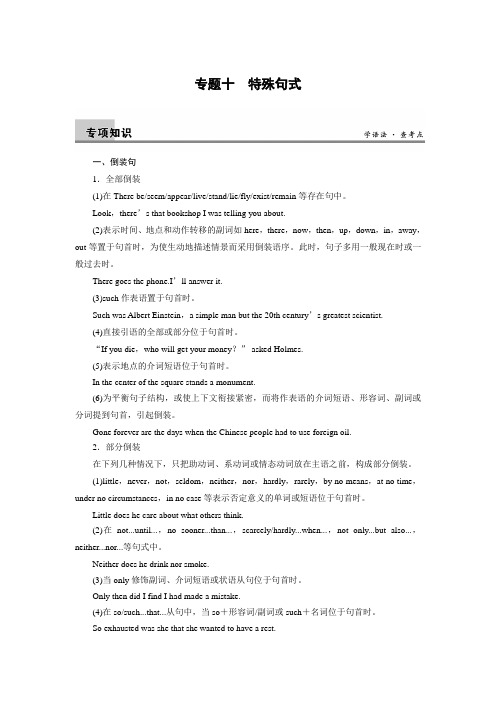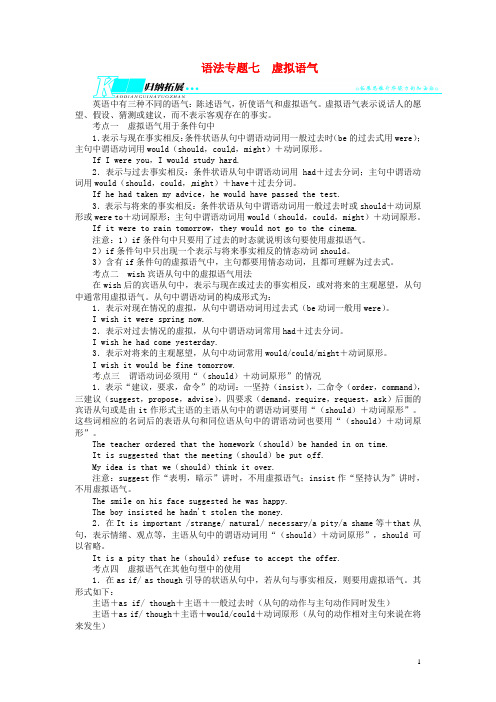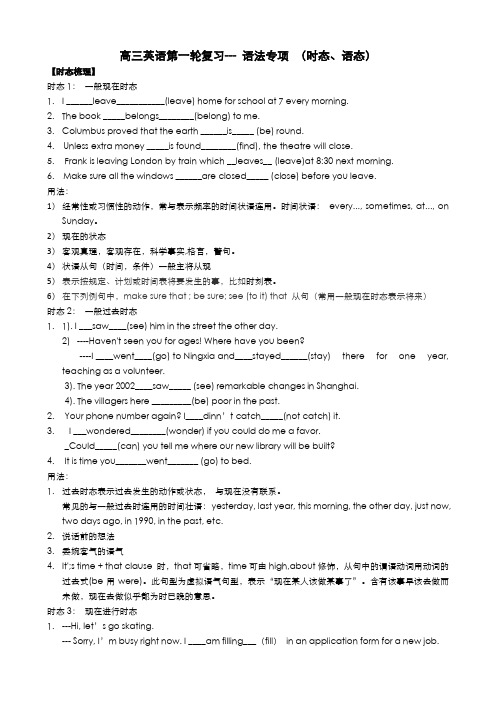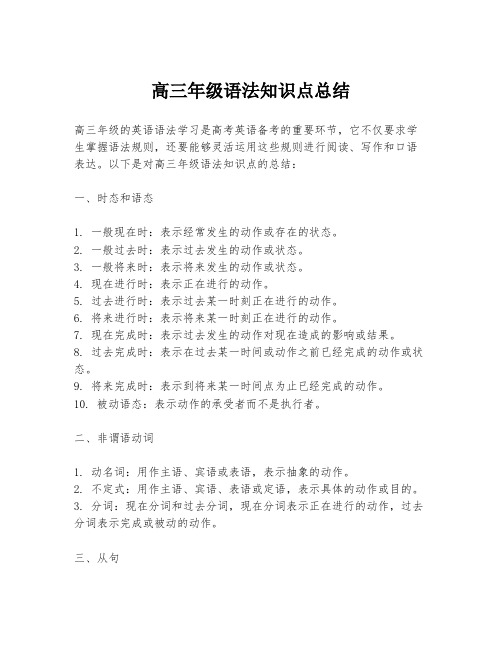2014届高三一轮语法复习时态过去时
时态语态课件高三上学期英语一轮复习

His plan is to be a success. You’re to be back before eleven o’clock at night. ②be to do 表示按计划、安排即将发生的动作;表示注定会发生的动 作;按职责、义务要求必须或应该去做的事。
完成式
将来完成时: 将来某一时间以前已经完成或一直持续的动作
He was about to leave when someone called him. ③be about to do 正要,刚要,表示即将发生的动作,不与表示将来 的时间状语连用,常用于“be about to do...when...”句型,意为:
02
进行式
一. 现在进行时 二. 过去进行时 三. 将来进行时
小结
过去
现在
was/were/did
am/is/are/do/does
一般
将来 will do
was/were doing
进行
am/is/are doing
will be doing
完成
现在进行时
Listen, they _a_r_e_s_in_g_i_n_g__ (sing) in the bathroom. (1)表示正在发生的动作 I __a_m__m_e_e_t_in_g__ (meet) Mr. Smith Zhang tonight. (2)表示近期的安排或计划 We __a_re__le_a_v_i_n_g__ (leave) for Beijing on Friday. (3)go, come等表示位置移动的动词可用进行时表将来时 The girl is always talking while having a meal. (4)与always, often 等频度副词连用,表示经常反复的行为或表达 某种感情色彩。
【高三一轮复习语法】动词的时态与语态(共28张ppt)

②在条件状语从句和时间状语从句中用一般现在时表将来(主将从现)。 If you leave tomorrow , I'll see you at the airport. 如果你明天走,我到机场送你。 When she comes, I'll tell her about it. 她来时我将把这件事告诉她。 (2)现在进行时表将来 现在进行时表示将来,往往是指计划好或准备要做的事。一些表示动作 转换的动词,如go, come, leave, start, begin,stay,take off,arrive等,或 者也称为位移性动词,其进行时表示马上要做某事。
• He used to get up early . 过去他总是早起。(现在不这样了) • He will be used to getting up early . 他将会习惯早起。 • Wood is used to make paper. 木材被用来造纸。
(三)一般将来时
1、表示将要发生的动作或存在的状态,常用的时间状语有later(on), soon, in a month, next time, from now on, tomorrow等。 I shall be eighteen years old next year. 明年我就十八岁了。 2、一般将来时的其它表示形式 (1)一般现在时表将来 ①按照计划或时刻表要发生的事情。 The new library opens next month. 新图书馆下月开放。 The plane takes off at 3:00 P.m. 飞机于下午三点起飞。
We are about to discuss this problem.我们将马上讨论这个问题。 They were about to leave when the telephone rang. 他们正要离开时电 话响了。
2014届高三一轮复习英语精品资料 专题十 特殊句式(新课标专用)Word版含解析

专题十特殊句式一、倒装句1.全部倒装(1)在There be/seem/appear/live/stand/lie/fly/exist/remain等存在句中。
Look,there’s that bookshop I was telling you about.(2)表示时间、地点和动作转移的副词如here,there,now,then,up,down,in,away,out等置于句首时,为使生动地描述情景而采用倒装语序。
此时,句子多用一般现在时或一般过去时。
There goes the phone.I’ll answer it.(3)such作表语置于句首时。
Such was Albert Einstein,a simple man but the 20th century’s greatest scientist.(4)直接引语的全部或部分位于句首时。
“If you die,who will get your money?” asked Holmes.(5)表示地点的介词短语位于句首时。
In the center of the square stands a monument.(6)为平衡句子结构,或使上下文衔接紧密,而将作表语的介词短语、形容词、副词或分词提到句首,引起倒装。
Gone forever are the days when the Chinese people had to use foreign oil.2.部分倒装在下列几种情况下,只把助动词、系动词或情态动词放在主语之前,构成部分倒装。
(1)little,never,not,seldom,neither,nor,hardly,rarely,by no means,at no time,under no circumstances,in no case等表示否定意义的单词或短语位于句首时。
Little does he care about what others think.(2)在not...until...,no sooner...than...,scarcely/hardly...when...,not only...but also...,neither...nor...等句式中。
高考英语一轮复习英语语法专题复习:时态和语态课件

语法知识
英语语法框架
音素★
语音 词法
音节 五种语音现象★ 九大词类 动词★ 词汇搭配 八种句子成分
时态 两大语态 三类非谓语动词
四类句子
句法
五种简单句
并列句
名词性从句
复合句★ 定语从句
特殊句式★ 状语从句
主谓一致
CONTENTS
时态与语态
• 一般时态 • 进行时态 • 完成时态 • 完成进行时态 • 主动语态 • 被动语态
now
future
将来完成进行时 will/shall have been doing
• 动作在某种情况下一直持续到将来某个时间仍未结束。 By the end of this year he will have been acting for thirty years.
将来进行时态
用法: ① 将来某个时间正在进行的动作,或会延续到将来的动作
What will you be ① 常和时间状语then, at that time/moment等连用。
语态是通过动词的变化表现出来的。
doing
at
this
time
next
Monday.
表示将来某个时间要发生的动作或存在的状态。
B. takes
C. is taking
D. has taken
B off at
【解析】考查时态。飞机、火车等按时刻表运行,表达时用一般现 在时表示将来。
一般过去时
(1) 表示过去某个时间发生的动作。 He proposed to Sarah on their annivesary.
(2) 过去某段时间的状态。 I loved him.
【志鸿优化设计】2014届高考英语第一轮复习 (归纳拓展+巩固提升)语法专题七 虚拟语气(含解析) 译林牛津

语法专题七虚拟语气英语中有三种不同的语气:陈述语气,祈使语气和虚拟语气。
虚拟语气表示说话人的愿望、假设、猜测或建议,而不表示客观存在的事实。
考点一虚拟语气用于条件句中1.表示与现在事实相反:条件状语从句中谓语动词用一般过去时(be的过去式用were);主句中谓语动词用would(should,could,might)+动词原形。
If I were you,I would study hard.2.表示与过去事实相反:条件状语从句中谓语动词用had+过去分词;主句中谓语动词用would(should,could,might)+have+过去分词。
If he had taken my advice,he would have passed the test.3.表示与将来的事实相反:条件状语从句中谓语动词用一般过去时或should+动词原形或were to+动词原形;主句中谓语动词用would(should,could,might)+动词原形。
If it were to rain tomorrow,they would not go to the cinema.注意:1)if条件句中只要用了过去的时态就说明该句要使用虚拟语气。
2)if条件句中只出现一个表示与将来事实相反的情态动词should。
3)含有if条件句的虚拟语气中,主句都要用情态动词,且都可理解为过去式。
考点二wish宾语从句中的虚拟语气用法在wish后的宾语从句中,表示与现在或过去的事实相反,或对将来的主观愿望,从句中通常用虚拟语气。
从句中谓语动词的构成形式为:1.表示对现在情况的虚拟,从句中谓语动词用过去式(be动词一般用were)。
I wish it were spring now.2.表示对过去情况的虚拟,从句中谓语动词常用had+过去分词。
I wish he had come yesterday.3.表示对将来的主观愿望,从句中动词常用would/could/might+动词原形。
高三一轮复习 动词时态语态

语法复习 语法复习1时态语态语法复习一. 一般现在时 1. 经常性的动作 2. 客观真理表示客观真理时,即使主句是一般过去式,宾语从句还要用一般现在时 3. 表示按规定、时间表、计划或安排要发生的事情谓语动词是come , go , arrive ,leave 等用一般现在时表将来 4. 确保make sure/see to it that当心 take care / be careful 后用一般现在时表将来Linda, make sure the tables _________(set) before the guests arrive. are set二.一般过去式1. 当说“我不知道你在这儿或我没意识到”这句话时,其实已经知道或已经意识到,因此不知道应是过去 I didn ’t know you were here.Edward, you played so well, But I ________(know) you played the piano. 2. May I have your attention please? I _____(come)here to tell you something important.3. for +一段时间 可用于一般过去时He is a famous film star now. He _______(work)in the factory for ten years. didn’t know / came / worked 三、一般将来时1. be going to 有迹象表明will 说明自己的看法,不一定有迹象 be going to 表示事先打算 will 表示临时性的决定 ----Ann is in hospital.---Oh really? I _________know. I _____go and visit her. didn ’t / will2. be to do / be to be done表将来 表应该 用于if 条件句表想要 打算四、现在完成时基本含义:过去的动作和现在有关系 1. 表示过去的动作对现在有影响和结果 2. 表示从过去一直持续到现在的动作或状态3. 现在完成时的标志1) ever(since) (位于句末单独使用) 或since +时间或sb. did2) in / over /during / the past /last few years 3) already , yet , recently , so far , lately , up to now 4) 包括现在在内的时间状语this year, todayMany patients ________(treat)this year than last year. have been treated 5) for+一段时间 如果语境中体现出了动作持续到现在则用现完 五.过去完成时基本含义:过去的过去如果句子用过去完成时,句子要有一个表示过去的时间状语或过去时(或含在语境中)After jack had sent some e-mails, he ______(start) working his project.---Kevin , you look worried , Anything wrong?---Well, I _______(take)a test and I ’m waiting for the result. had started / had taken 六、将来完成时表示动作到将来才能完成常与介词+将来的时间状语连用by next month , on the next birthday 等 七、现在进行时与过去进行时1.表示某一个时间点或时间段正在进行的动作2. 表示现阶段正在进行的动作或情况3. 进行时表将来1)表示从一个地方到另一个地方的动词如arrive / come / drive / fly 等 2)表示位置的动词如stay/ remain3)动词do 与have4)表示意图、安排 、打算的动词 We _____________(leave) very early that day, so we packed the night before. were leaving4. 表示没有完成---Has Sam finished his homework today?---I have no idea. He ______it this morning. was doing5. 与always /forever/constantly 等连用表示赞赏 反对 埋怨等情绪 八、将来进行时1.表示将来某一时刻或某一阶段正在进行的动作2.表示预计不久要发生或势必要发生 或对将来一种形象的描述You will be sitting in your favorite university at time next year. 九、完成进行时构成have/ had been doing 1. 延续译:He has read the book. He has been reading the book. 他已经读过那本书了。
高考英语第一轮复习 时态和语态复习

4.---I’m sorry , I shouldn’t have been so rude to you. -----You _____ your temper but that’s OK.
1 一般现在时的用法
2) 客观真理,客观存在,科学事实或表示格言或警句。 ①Knowledge begins with practice. ② She said that the sea water is salty. ③In some parts of the world, such as in England ,
2.----I’ve bought a box of chocolates for our daughter. ---Oh, how good a dad! But she doesn’t like sweet things. _____ that?
A. Don’t you know B. Haven’t you known
考点 一
进 将完
完
般
行 来成
成
体
体 体体
进
年号
行
体
2004 24
26
2005
29
29
2006
23
最常用的几种时态与时间状语的搭配
一般现在 every …, sometimes, at …, on Sunday 现在进行 now,
现在完成 for, since, so far, ever, never, just, yet, till/until, up to now, in the past years, always, recently
高考英语时态知识大全汇总

高考英语时态知识大全汇总时态在英语中扮演着非常重要的角色,准确使用时态能够帮助我们清晰地表达自己的意思,因此在高考英语考试中也是一个重要的知识点。
下面是高考英语时态知识的详细介绍。
一、一般现在时一般现在时表示经常性的、习惯性的动作、事实或者真理。
结构:主语 + 动词原形(第三人称单数加s或es)1. 表示经常性的动作或习惯例句:I always get up early in the morning.I often go to the park on weekends.2. 表示客观真理或普遍规律例句:The sun rises in the east.Water boils at 100 degrees Celsius.二、一般过去时一般过去时表示过去某个时间发生的动作或存在的状态。
结构:主语 + 动词的过去式1. 表示过去发生的某个具体动作例句:Yesterday, I went to the cinema with my friends.They visited their grandparents last week.2. 表示过去的某个状态或习惯性动作例句:He used to swim every day when he was young.She lived in London for five years.三、一般将来时一般将来时表示将来某个时间会发生的动作或存在的状态。
结构:主语 + will + 动词原形1. 表示未来发生的某个具体动作例句:I will visit my grandparents next week.She will go shopping tomorrow.2. 表示预测、打算或意愿例句:I think it will rain tonight.They will have a party to celebrate their anniversary.四、现在进行时现在进行时表示正在进行的动作。
高考各大时态知识点汇总

高考各大时态知识点汇总高考英语的时态是考生们需要重点掌握的内容之一。
掌握好时态的用法,不仅可以提高写作和阅读理解的能力,还能够在口语交流中更准确地表达自己的意思。
下面将对高考中常见的时态进行汇总与讲解。
一、一般现在时(Simple Present Tense)一般现在时表示经常性的动作、习惯、常态等情况。
主要的时间状语有:always,usually,often,sometimes等。
例如:“I often go to school by bus.”二、一般过去时(Simple Past Tense)一般过去时表示过去发生的动作或存在的状态。
它与现在或将来相比,发生在过去的时间。
主要的时间状语有:yesterday,last night,two days ago等。
例如:“He talked to his teacher yesterday.”三、一般将来时(Simple Future Tense)一般将来时表示将来某个时间要发生的动作或存在的状态。
主要是用“will”加动词原形来表达。
例如:“I will visit my grandparents next week.”四、现在进行时(Present Continuous Tense)现在进行时表示现在正在进行或发生的动作。
主要是用“be”动词的各种形式加动词ing形式来表达。
例如:“She is reading a book right now.”五、过去进行时(Past Continuous Tense)过去进行时表示过去某一时刻正在进行或发生的动作。
主要是用“was/were”加动词ing形式来表达。
例如:“They were playing basketball at that time yesterda y.”六、将来进行时(Future Continuous Tense)将来进行时表示将来某一时间正在进行或发生的动作。
即将来某个时间点开始的动作,要发生在该时间段内并持续一段时间。
高三英语语法复习智慧讲解(三)

a corner in the shop. So I caught him.
A. was putting B. was put
C. have put
D. had put
【解析】选A。考查动词时态。过去进行时表示过去某一时间 正在发生的动作。
4. (2014· 马鞍山模拟)—Hi, Mathew, you look so deadly tired. —Yeah. I A. cleaned C. have been cleaning the messy flat all day. B. had cleaned D. have cleaned
【解析】选D。考查动词时态。由时间状语By next month知, 句子应用将来完成时表示将来时间就要完成的动作。
13. (2014· 扬州模拟)He was unhappy when he sold his guitar. After all, he A. has had it for a very long time. B. had had C. has D. had
【解析】选B。考查动词时态。句意: 昨晚我本想帮助你, 但我
没能腾出时间来, 因为我正在写一篇今早必须交的作文。根据
句中的时间状语可知“我”昨晚一直在写作文, 故选B项。
【加固训练】 (2014· 吉林模拟)—How did you catch the thief? —Well, he some goods into his bag wቤተ መጻሕፍቲ ባይዱen I came around
【解析】选 D 。考查动词时态。动词 come 可用过去进行时表 示过去将来时。
8. (2014· 郑州模拟 )Wang, I hear that you Mekong River. Have you got everything ready? A. traveled C. have traveled B. are traveling D. travel
高考英语语法总结材料

高考英语语法总结材料
一、时态
2、一般过去时:表示过去发生的动作或存在的状态,常与yesterday, last week/month/year, ago等时间状语连用。
3、一般将来时:表示将来发生的动作或存在的状态,常与tomorrow, next week/month/year, soon等时间状语连用。
4、现在进行时:表示正在发生的动作,常与now, at present, at the moment等时间状语连用。
5、现在完成时:表示动作已经完成,常与just, already, yet等副
词连用。
6、现在完成进行时:表示从过去一些时间延续到现在的动作,常与for, since等时间状语连用。
7、将来进行时:表示将来正在进行的动作,常与tomorrow, next week/month/year, soon等时间状语连用。
8、将来完成时:表示将来的一种完成的动作,常与by the end of, by then等时间状语连用。
二、语态
1、被动语态:表示动作的承受者,常与by短语连用。
2、主动语态:表示动作的执行者,常与to短语连用。
三、定语从句
1、一般定语从句:表示合成一句话,常与that, which, who, whom, whose等关系代词连用。
四、名词
1、可数名词:表示可以分开计量的有形的物体或抽象的概念,常与a, an, the, two, three等冠词连用。
2、不可数名词:表示无法计量的无形的状态或抽象的概念,常与some, any, much, little等词连用。
高三英语第一轮复习时态语态(教师版)

高三英语第一轮复习--- 语法专项(时态、语态)【时态梳理】时态1:一般现在时态1.I ______leave___________(leave) home for school at 7 every morning.2.The book _____belongs________(belong) to me.3.Columbus proved that the earth ______is_____ (be) round.4. Unless extra money _____is found________(find), the theatre will close.5. Frank is leaving London by train which __leaves__ (leave)at 8:30 next morning.6. Make sure all the windows ______are closed_____ (close) before you leave.用法:1)经常性或习惯性的动作,常与表示频率的时间状语连用。
时间状语:every..., sometimes, at..., on Sunday。
2)现在的状态3)客观真理,客观存在,科学事实,格言,警句。
4)状语从句(时间,条件)一般主将从现5)表示按规定、计划或时间表将要发生的事,比如时刻表。
6)在下列例句中,make sure that ; be sure; see (to it) that 从句(常用一般现在时态表示将来)时态2:一般过去时态1.1). I ___saw____(see) him in the street the other day.2)----Haven't seen you for ages! Where have you been?----I ____went____(go) to Ningxia and____stayed______(stay) there for one year, teaching as a volunteer.3). The year 2002____saw_____ (see) remarkable changes in Shanghai.4). The villagers here _________(be) poor in the past.2. Your phone number again? I____dinn’t catch_____(not catch) it.3. I ___wondered________(wonder) if you could do me a favor._Could_____(can) you tell me where our new library will be built?4. It is time you_______went_______ (go) to bed.用法:1.过去时态表示过去发生的动作或状态,与现在没有联系。
高三英语一般现在时般过去时现在进行时过去进行时般将来时

There goes the bell. = The bell is ringing. 铃响了..
5、在下列情况下表示将来:
1在状语从句中用一般现在时代替一般将来时..
如:I will give it to him as soon as I see him. 我一看见他就交给他..
3ago系列: two months ago; three years ago
4in系列:in 1990; in 2012
特殊:just now ;in the past等等..
二、基本结构:主语+ be 动词过去式/动词过去式+其他
She often came to help us in those days.
2在过去一段时间内的经常性或习惯性动作..常与often;always;usually等频度副词连用..
如: Sally often does some reading in the morning.
We often played together when we were children.
3表示主语过去的特征或性格..
过去时练习:写出下列动词的过去式
is\am_________ fly_______ plant________ are ________ drink_________
play_______ go________ make ________ does_________ dance________
worry________ ask _____ taste_________ eat__________ draw________
高考语法时态考点

高考语法时态考点一、时态的基本概念时态是动词的一种形式,表示时间。
根据中学英语教学大纲要求,学生需要掌握的相关时态包括一般现在时、一般过去时、一般将来时、现在进行时、过去进行时、现在完成时和过去完成时等。
二、一般现在时一般现在时表示经常性的或普遍性的动作、状态或存在。
它通常与一般现在时的时间状语连用,如usually、often、always、sometimes等。
例如:1. I usually go to bed before 11 p.m.2. Tom often plays basketball after school.三、一般过去时一般过去时表示在过去某个时间发生的动作或存在的状态。
它通常与一般过去时的时间状语连用,如yesterday、last week等。
例如:1. They went to the amusement park last Sunday.2. She studied English for three hours yesterday.四、一般将来时一般将来时表示将要发生的动作或存在的状态。
它通常与一般将来时的时间状语连用,如tomorrow、next week等。
在一般将来时中,主语常常是第一人称或第三人称。
例如:1. I will visit my grandparents tomorrow.2. He is going to buy a new car next month.五、现在进行时现在进行时表示正在进行的动作或存在的状态,常用be+Ving的形式。
它通常与现在进行时的时间状语连用,如now、at the moment等。
例如:1. They are watching TV right now.2. She is studying in the library at the moment.六、过去进行时过去进行时表示过去某个时间正在进行的动作或存在的状态,常用was/were+ Ving形式。
高三英语时态知识点总结

高三英语时态知识点总结英语时态是英语语法中十分重要的一部分,对于学习者来说,掌握各种时态的用法是提高英语水平的关键之一。
本文将总结高三英语学习过程中常用的时态知识点,以帮助学生们更好地理解和运用。
一、一般现在时(Simple Present Tense)一般现在时表示经常性的动作、习惯、自然现象、真理和感觉等。
1. 结构:主语 + 动词原形(第三人称单数加s)2. 例句:- I like to play basketball.(我喜欢打篮球。
)- He watches TV every evening.(他每天晚上看电视。
)- The sun rises in the east.(太阳从东方升起。
)二、一般过去时(Simple Past Tense)一般过去时表示过去某个具体时间发生的动作或状态。
1. 结构:主语 + 动词过去式2. 例句:- I visited my grandparents last weekend.(上个周末,我去拜访了我的祖父母。
)- She bought a new car two years ago.(两年前,她买了一辆新车。
)- They lived in London before moving to Paris.(在搬到巴黎之前,他们住在伦敦。
)三、现在进行时(Present Continuous Tense)现在进行时表示现在正在进行的动作,强调动作的暂时性。
1. 结构:主语 + be动词(am/is/are)+ 现在分词2. 例句:- She is studying for her exams at the moment.(她此刻正在为考试复习。
)- We are having dinner now.(我们现在正在吃晚餐。
)- The children are playing in the park.(孩子们正在公园玩耍。
)四、将来时态(Future Tense)将来时态表示将要发生的动作或状态。
高三年级语法知识点总结

高三年级语法知识点总结高三年级的英语语法学习是高考英语备考的重要环节,它不仅要求学生掌握语法规则,还要能够灵活运用这些规则进行阅读、写作和口语表达。
以下是对高三年级语法知识点的总结:一、时态和语态1. 一般现在时:表示经常发生的动作或存在的状态。
2. 一般过去时:表示过去发生的动作或状态。
3. 一般将来时:表示将来发生的动作或状态。
4. 现在进行时:表示正在进行的动作。
5. 过去进行时:表示过去某一时刻正在进行的动作。
6. 将来进行时:表示将来某一时刻正在进行的动作。
7. 现在完成时:表示过去发生的动作对现在造成的影响或结果。
8. 过去完成时:表示在过去某一时间或动作之前已经完成的动作或状态。
9. 将来完成时:表示到将来某一时间点为止已经完成的动作。
10. 被动语态:表示动作的承受者而不是执行者。
二、非谓语动词1. 动名词:用作主语、宾语或表语,表示抽象的动作。
2. 不定式:用作主语、宾语、表语或定语,表示具体的动作或目的。
3. 分词:现在分词和过去分词,现在分词表示正在进行的动作,过去分词表示完成或被动的动作。
三、从句1. 名词性从句:包括主语从句、宾语从句、表语从句和同位语从句。
2. 状语从句:包括时间、地点、原因、结果、条件、让步等状语从句。
3. 定语从句:用来修饰名词或代词,通常由关系代词或关系副词引导。
四、虚拟语气1. 与现在事实相反:使用过去时态。
2. 与过去事实相反:使用过去完成时。
3. 与将来事实相反:使用过去将来时。
五、直接引语和间接引语1. 直接引语:直接引用别人的原话。
2. 间接引语:转述别人的话,需要根据时态、人称和指示词进行相应的变化。
六、主谓一致1. 语法一致:主语和谓语在数上保持一致。
2. 意义一致:根据主语的意义决定谓语的单复数形式。
七、强调句型1. it is/was + 强调部分 + that/who 结构,用于强调句子中的某个成分。
八、倒装句1. 完全倒装:整个谓语放在主语之前。
高考英语知识点时态语法

高考英语知识点时态语法时态是英语语法中的重要概念,也是高考英语考试中常考的知识点之一。
准确运用时态可以增强语言表达的准确性和连贯性,使文章更加丰富多样。
本文将为大家介绍高考英语常见的时态知识点和用法。
一、一般现在时(Simple Present)一般现在时用于表示经常性的动作、习惯性的行为或普遍的真理。
一般现在时的基本形式是主语加谓语动词的原形。
例句:1. He plays football every Sunday.(他每个星期天踢足球。
)2. The sun rises in the east.(太阳从东方升起。
)二、一般过去时(Simple Past)一般过去时用于表示过去某个时间发生的动作或存在的状态。
一般过去时的基本形式是主语加动词的过去式。
例句:1. They visited the museum last week.(上周他们参观了博物馆。
)2. She lived in London for five years.(她在伦敦生活了五年。
)三、一般将来时(Simple Future)一般将来时用于表示将来某个时间将要发生的动作或存在的状态。
一般将来时的基本形式是主语加 will 加动词的原形。
例句:1. I will go to the party tomorrow.(我明天要去参加派对。
)2. They will finish the project next month.(他们下个月要完成这个项目。
)四、现在进行时(Present Continuous)现在进行时用于表示目前正在进行的动作或存在的状态,也可用于表示近期将要发生的未来安排。
现在进行时的基本形式是主语加is/am/are 加动词的现在分词形式。
例句:1. She is reading a book now.(她正在看书。
)2. We are going to the cinema this evening.(我们今晚要去电影院。
- 1、下载文档前请自行甄别文档内容的完整性,平台不提供额外的编辑、内容补充、找答案等附加服务。
- 2、"仅部分预览"的文档,不可在线预览部分如存在完整性等问题,可反馈申请退款(可完整预览的文档不适用该条件!)。
- 3、如文档侵犯您的权益,请联系客服反馈,我们会尽快为您处理(人工客服工作时间:9:00-18:30)。
2014届高三一轮语法复习时态——过去时(2)Class: Name:
二.Fill in the blanks with the proper tense.
1.Bob _____(fall)ill in the classroom the other day, when he ______(have) an exam.
2. “What______ you say?” he asked and ___________(look)at me in anger.
3.I ____________(wander) along the street when I ________(see) a familiar smiling face of my old friend.
4.When I ________ (be)young, I ___________(listen) to the radio,waiting for my favorite song, which always made me smile.
5. The thief ________(slip) into the room when nobody ___________(look).
6.He could have done it better,but he ________(be) too careless.
7. By the end of the Spelling Bee, the competitors _____________(spell) nearly 500 hundred words
in total.
8.That dinner was the most expensive one that I _____________(have).
9. While he _________(drive), he was thinking about the puzzling question.
10.Hardly_______the headmaster________(announce)the good news when the students ________(cheer) excitedly.
11. We _____________(hope) to catch the Express Train but we failed to.
三.Fill in the blanks with the proper tense according to the context.
I 1.___________ (walk) down a dimly lit street one evening when I 2.________(hear) screams coming from behind some bushes. Alarmed, I 3._________(slow) down to listen, and panicked when I 4.__________ (realize) that what I was hearing were the sounds of a struggle. Only yards from where I stood, a woman 5.__________________(attack).
“Should I get involved?” I thought.I was frightened for my own safety, and I 6.________(hate)myself for having chosen to go home at this time. I should have decided to take a new route home that night. “What if I 7.__________(hurt)too? Just run to the nearest phone and ca ll the police?” Although it 8._________(feel) like an eternity(漫长的时间), my thought process
9._______ only _________(take). But alread y the girl’s cries 10._____________(grow)weaker.
I knew I had to act fast. “How can I walk away from this?” I 11.________ (ask)myself. “No”,
I finally resolved (决定). “I cannot turn my back on the fate of this unknown woman, even if it
12._________(mean)risking my own life.” I am not a brave man, nor am I strong. I don’t know where I 13.________(find) the courage and physical strength, but once I had finally decided to help the girl, I became suddenly changed. I 14.______(run) behind the bushes and pulled the attacker off the woman. Stuggling, we fell to the ground, where we 15__________(fight) for a few minutes until the man jumped up and escaped.
四.Fill in the blanks according to the first letter and the passage.One word for each blank.
The first story is about connecting the dots.
I d__________out of Reed College after the first 6 months, but then stayed around as a drop-in for another 8 months or so before I really quit. So why did I d_________ out?
第一个故事讲的是点与点之间的关系。
我在里德学院(Reed College)只读了六个月就退学了,此后便在学校里旁听,又过了大约一年半,我彻底离开。
那么,我为什么退学呢?
It s_______ before I was born. My biological mother _______a young, unwed college graduate student, and she d________ to put me up for adoption. She f______ very strongly that I should be a_________ by college graduates, so everything was all set for me to be adopted at birth by a lawyer and his wife, except that when I popped out they decided at the last minute that they really w______ a girl. So my parents, who were on a waiting list, g_______ a call in the middle of the night asking: “We _________an unexpected baby boy; do you want him?” They said: “Of course.” M y biological mother later ________out that my mother _______never g_________ from college and that my father had never graduated from high school. She refused to sign the final adoption papers. She only relented a few months later when my parents promised that I w________ someday go to college.
这得从我出生前讲起。
我的生母是一名年轻的未婚在校研究生,她决定将我送给别人收养。
她非常希望收养我的是有大学学历的人,所以把一切都安排好了,我一出生就交给一对律师夫妇收养。
没想到我落地的霎那间,那对夫妇却决定要一名女孩。
就这样,我的养父母─当时他们还在登记册上排队等著呢─半夜三更接到一个电话: “我们这儿有一个没人要的男婴,你们要么?”“当然要”他们回答。
但是,我的生母后来发现我的养母不是大学毕业生,我的养父甚至连中学都没有毕业,所以她拒绝在最后的收养文件上签字。
不过,没过几个月她就心软了,因为我的养父母许诺日后一定送我上大学。
